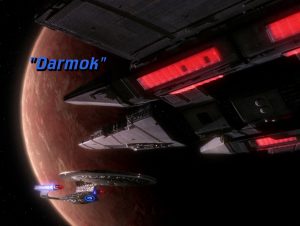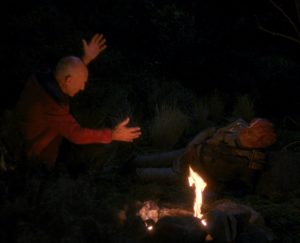Star Trek: The Next Generation is thirty years old this month! To celebrate, Redeeming Culture is assembling the finest crew of culture redeemers from all over the internet to investigate the spiritual harmonies in this cornerstone of science fiction.
For more about Trektember, read our preview post. Please note that there are minor plot spoilers for this episode below.
Reed Lackey, his arms wide; season 5, episode 2: Darmok.
• •
 A recurring theme in some of the strongest episodes of Star Trek: The Next Generation is the pursuit of understanding. You could almost say that this theme is a core value of the Star Trek universe as a whole. For me, the most poignant and moving example of this pursuit that the show ever delivered was in its fifth season, with the episode “Darmok.”
A recurring theme in some of the strongest episodes of Star Trek: The Next Generation is the pursuit of understanding. You could almost say that this theme is a core value of the Star Trek universe as a whole. For me, the most poignant and moving example of this pursuit that the show ever delivered was in its fifth season, with the episode “Darmok.”
When the Enterprise crew is tasked to contact the mysterious Tamarian race, they encounter a crew who seem to speak only in incomprehensible combinations of proper names, geographic locations, and nonsensical actions. Coming to an apparent revelation, Dathon – the captain of the Tamarian race – beams down to a nearby planet, abruptly taking Captain Picard down with him.
What follows is a complex and fascinating mystery revolving around the nature of communication: one which has provocative and inspiring implications about the risks, the hopes, and the promises inherent in the struggle to understand those who are unlike us.
For the sake of the point, I’ll skip to the ending: the Tamarians only speak in metaphor and allegory. They use words that the Enterprise crew can understand, like “when the walls fell” or “his eyes uncovered,” but without the conceptual understanding of the events being referenced, there is no understanding of the intention. It is not until Picard and Dathon are forced to combat a common foe (an electrical beast on the planet’s surface) that Picard is able to finally comprehend the efforts Dathon is making to bridge their two cultures.
Sadly, the understanding comes after Dathon has sustained fatal injuries. Picard returns to the Enterprise to inform the Tamarian crew, finally grasping at least enough of their language to communicate the simple, tragic message.
 The episode is not the most thrilling, or even the most complex, but a large part of its resonance lies in the beautiful portrayal of the struggle towards mutual understanding. Genesis chapter 11 details a story about the building of the Tower of Babel, when God confused the languages of the people so that the project could not be completed. Hearing the story as a child, I compartmentalized the details into an idea of the creation of the different languages; in other words, I perceived it only through terms of vocabulary.
The episode is not the most thrilling, or even the most complex, but a large part of its resonance lies in the beautiful portrayal of the struggle towards mutual understanding. Genesis chapter 11 details a story about the building of the Tower of Babel, when God confused the languages of the people so that the project could not be completed. Hearing the story as a child, I compartmentalized the details into an idea of the creation of the different languages; in other words, I perceived it only through terms of vocabulary.
But Darmok inspired me to reframe the ancient story. I considered that not only were the vocabularies separated, but it may have possibly been the starting point of misunderstanding in general. Communication is far more than merely vocabulary; this is another reason why understanding what the words are does not always equate to an understanding of what the words mean. Simple phrases such as “I love you” or “I hate you” may have wildly differing meanings depending on the context, tone, and circumstances in which they are spoken.
The other challenging element to the narrative is that the text claims it was God who confused the languages. Depending on the interpretation of the text, someone might perceive God as threatened by the project, establishing petty measures to ensure its failure. But again, knowing what the words say doesn’t always equate to knowing what the words mean.
[pullquote]Kailash, when it rises. (The accomplishments which require the most from us produce the greatest rewards.)[/pullquote]Because there are so many things that would be easier if they didn’t require work. Imagine how much easier relationships of any variety would be if vocabulary and meaning were uniform across all cultures and perspectives. But there is a profound mystery infused in the effort towards reconciliation: that often the accomplishments which require the most from us produce the greatest rewards.
 The joy which washes over Picard and Dathon as they begin to find common ground in their communication is deeply moving. Strangers become friends, opponents become comrades, and one more war-threatening barrier collapses into community.
The joy which washes over Picard and Dathon as they begin to find common ground in their communication is deeply moving. Strangers become friends, opponents become comrades, and one more war-threatening barrier collapses into community.
Picard wonders as the encounter begins, “Are they truly incomprehensible? In my experience, communication is a matter of patience, imagination. I would like to believe that these are qualities that we have in sufficient measure.” If only we carried such prophetic hope into our potential conflicts with others.
Because there is a second part to the story begun in the Tower of Babel, one that didn’t emerge until thousands of years later. In Acts chapter 2, after Jesus had died, resurrected, and ascended into Heaven, His disciples were praying together in an upper room when this happened:
They saw what seemed to be tongues of fire that separated and came to rest on each of them. All of them were filled with the Holy Spirit and began to speak in other tongues as the Spirit enabled them. Now there were staying in Jerusalem God-fearing Jews from every nation under heaven. When they heard this sound, a crowd came together in bewilderment, because each one heard their own language being spoken.” –Acts 2:3-6, NIV
Each person heard their own language being spoken by foreigners. What once had been confusion, converges together into harmony and wholeness once again.
[pullquote class=”left”]Sokath, his eyes uncovered! (What once had been confusion, converges together into harmony and wholeness once again.)[/pullquote]The struggle to understand and to communicate with others is often fragile, scary, and difficult. But once understanding is reached, tremendous joy emerges as unity and harmony are possible once again. The beauty we too often fail to recognize in what happened on the Day of Pentecost (Acts 2) is that through the Holy Spirit, there is hope for harmony again. Our enemies can become our comrades, strangers can become our friends, and walls come tumbling down.
 Followers of Christ have a holy charge to carry that divine fire of reconciliation into all the world; and as ambassadors to that end, to make community of those who were once utterly incomprehensible. It is our gift, it is our mission, it is our common purpose.
Followers of Christ have a holy charge to carry that divine fire of reconciliation into all the world; and as ambassadors to that end, to make community of those who were once utterly incomprehensible. It is our gift, it is our mission, it is our common purpose.
In other words, it’s what we mean.
• • •
Thanks for reading Trektember on Redeeming Culture. Reed Lackey sticks with us tomorrow to review Spock’s return to the Star Trek universe in Unification. Uzani, with fists open!
• • •
• • •
Reed Lackey is the host of The Fear of God podcast, where he redeems horror films; he can also be heard on the Reel World Theology podcast.


